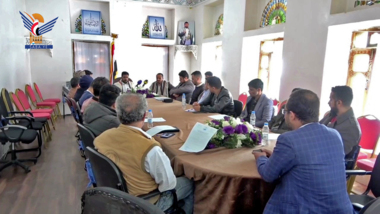
MARIB December 11. 2023 (Saba)-The branch of the Supreme Council for the Administration and Coordination of Humanitarian Affairs in Marib province organized today,Monday, a consultative meeting for organizations and institutions working in the humanitarian field in the province.
The meeting reviewed the humanitarian situation in the province , its needs for basic projects and services, as well as an evaluation of organizations’ interventions during the past period and the repercussions of the World Food Program’s decision to stop food aid to Yemenis in the liberated areas.
Director of the Humanitarian Affairs Council branch in the province, Saleh Al-Sharif, explained that the meeting highlights the province’s needs in the basic sectors, according to the need matrix, given the weakness of basic services in the province as a result of the conditions imposed by the aggression and siege.
The WFP's decision to stop food aid was considered a political decision and collective punishment against the Yemeni people as a result of its positions in support of the Palestinians.
Al-Sharif pointed out the importance of bridging the gap and mitigating the catastrophic repercussions of the decision through implementing economic empowerment and livelihood projects, which would raise the economic level of displaced families affected by the aggression.
While the Director of Marib Governor’s Office, Fawaz Al-Salhi, reviewed the worsening needs of the province people , stressing the necessity of continuing to support vital sectors directly related to the lives of citizens and focusing on supporting sustainability in projects.
The meeting included extensive discussions by representatives of the organizations, during which they stressed their keenness to provide aid to Marib province and redouble efforts to expand interventions in basic sectors to alleviate the suffering of citizens.
J.A
The meeting reviewed the humanitarian situation in the province , its needs for basic projects and services, as well as an evaluation of organizations’ interventions during the past period and the repercussions of the World Food Program’s decision to stop food aid to Yemenis in the liberated areas.
Director of the Humanitarian Affairs Council branch in the province, Saleh Al-Sharif, explained that the meeting highlights the province’s needs in the basic sectors, according to the need matrix, given the weakness of basic services in the province as a result of the conditions imposed by the aggression and siege.
The WFP's decision to stop food aid was considered a political decision and collective punishment against the Yemeni people as a result of its positions in support of the Palestinians.
Al-Sharif pointed out the importance of bridging the gap and mitigating the catastrophic repercussions of the decision through implementing economic empowerment and livelihood projects, which would raise the economic level of displaced families affected by the aggression.
While the Director of Marib Governor’s Office, Fawaz Al-Salhi, reviewed the worsening needs of the province people , stressing the necessity of continuing to support vital sectors directly related to the lives of citizens and focusing on supporting sustainability in projects.
The meeting included extensive discussions by representatives of the organizations, during which they stressed their keenness to provide aid to Marib province and redouble efforts to expand interventions in basic sectors to alleviate the suffering of citizens.
J.A
resource : SABA